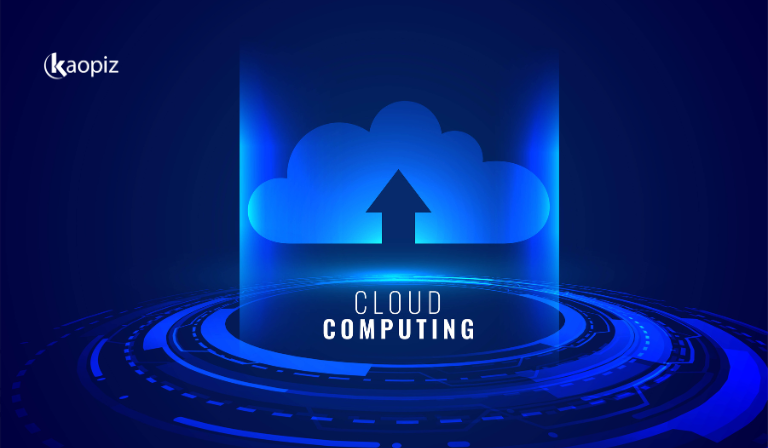10 Key Benefits of Cloud Computing for Businesses in 2025
Cloud computing has transformed the way businesses operate, offering unmatched flexibility, scalability, and efficiency. As digital transformation accelerates, cloud adoption continues to be a game-changer for companies of all sizes. From cost savings to enhanced security and AI integration, cloud technology provides businesses with a competitive edge in an increasingly digital world. In this blog, we’ll explore the 10 key benefits of cloud computing for companies in 2025.
Table of Contents
- What is Cloud Computing?
- How Does Cloud Computing Work?
- Top 10 Benefits of Cloud Computing
- Cost Savings and Efficiency
- Scalability and Flexibility
- Enhanced Security and Data Protection
- Faster Innovation and Time to Market
- Disaster Recovery and Business Continuity
- Remote Work and Collaboration
- Sustainability and Green Computing
- Automatic Updates and Maintenance
- Competitive Advantage and AI Integration
- Compliance and Regulatory Benefits
- Drawbacks of Cloud Computing
- How Kaopiz Helps Businesses Leverage Cloud Computing
- Conclusion
- FAQs
What is Cloud Computing?
Cloud computing refers to the on-demand delivery of computing resources – including hardware, storage, databases, networking, and software – over the Internet. Instead of relying on in-house IT infrastructure, businesses and individuals can access computing power remotely, paying only for what they use.
As businesses generate and store more data than ever, managing traditional on-premises servers has become costly and complex. Cloud computing provides a scalable and cost-effective alternative, enabling companies to run applications, store files, and process large amounts of data without maintaining physical hardware.

Businesses can choose from three main cloud deployment models (Public Cloud, Private Cloud, and Hybrid Cloud) depending on their security, control, and flexibility needs:
There are three primary cloud service models (IaaS, PaaS, SaaS), each catering to different business needs:
- Infrastructure as a Service (IaaS): Provides on-demand access to computing resources like servers, storage, and networking, allowing businesses to manage their IT infrastructure without purchasing physical hardware.
- Platform as a Service (PaaS): Offers a development environment with the necessary tools (hardware, OS, and middleware) to build, test, and deploy applications.
- Software as a Service (SaaS): Delivers fully functional software applications over the cloud, with providers handling maintenance, updates, and security (e.g., Google Workspace, Dropbox, Salesforce).
How Does Cloud Computing Work?
As the world becomes increasingly digital, businesses and individuals generate vast amounts of data. Storing and managing this data on personal computers or in-house servers is becoming costly and inefficient. This is where cloud computing comes in – it acts as a virtual storage locker that allows users to access data and applications from anywhere with an internet connection.
With cloud computing, users can log into their cloud accounts and start working on any device, whether a laptop, smartphone, or tablet. Instead of storing everything on physical hard drives, data and applications are hosted on remote cloud servers managed by cloud providers like Amazon Web Services (AWS), Google Cloud, and Microsoft Azure.

For example, a company using a cloud-based CRM system allows employees to update customer information in real-time. A salesperson on the road can access client details on their phone, while a manager at the office can track sales progress on their computer.
By using cloud computing applications, businesses can save costs, improve efficiency, and enhance data security. In the next section, we’ll explore its key benefits and why cloud computing is important for an organization.
Top 10 Benefits of Cloud Computing
Cloud computing offers numerous advantages that help businesses stay agile, efficient, and competitive. Here are the top 10 benefits that make cloud technology essential in 2025.
Cost Savings and Efficiency
One of the biggest advantages of using cloud services is their ability to reduce costs and improve efficiency. Instead of investing in expensive hardware and IT infrastructure, businesses can use cloud services on a pay-as-you-go model, only paying for the resources they need.
Key cost savings and efficiency benefits:
- Eliminates the need to buy and maintain physical servers.
- Cloud providers handle updates, security, and maintenance.
- Reduces electricity costs by eliminating in-house data centers.
- New applications and services can be launched quickly.
- Employees can work from anywhere, increasing productivity.
- Cloud services use automation to streamline processes and reduce manual work.
Scalability and Flexibility
Another benefit of cloud computing for businesses is to scale resources up or down instantly based on demand, without the need for costly infrastructure upgrades.

Key scalability and flexibility benefits:
- Increase storage and computing power as your business grows.
- Pay only for the resources you use, avoiding unnecessary expenses.
- Deploy new services quickly without hardware limitations.
Enhanced Security and Data Protection
Cloud computing provides advanced security measures to protect sensitive data from cyber threats, data breaches, and system failures. Leading cloud providers implement strong encryption, regular security updates, and multi-factor authentication to ensure data safety.
Key security benefits:
- Protects information during storage and transmission.
- Prevents data loss with automated backup solutions.
- AI-powered monitoring identifies and blocks cyber threats.
- Multi-factor authentication and role-based permissions enhance security.
Faster Innovation and Time to Market
Cloud computing enables businesses to develop, test, and deploy applications faster by eliminating hardware limitations and long setup times. By removing infrastructure barriers, cloud computing accelerates innovation and speeds up time to market, helping businesses stay ahead of the competition.
Key advantages:
- Launch new instances in seconds.
- Build and test applications without delays.
- Adjust resources to meet project needs instantly.
Disaster Recovery and Business Continuity
Cloud computing ensures data protection and business continuity by offering automated backups and disaster recovery solutions. This helps businesses minimize downtime and recover quickly from unexpected failures.

Key benefits:
- Data is securely stored and easily recoverable.
- Minimize downtime with quick data restoration.
- Ensures redundancy and protection against local failures.
Remote Work and Collaboration
Suppose your business has multiple team members; collaboration is essential for maximizing innovation and productivity. Cloud computing enables teams to work remotely and collaborate seamlessly anytime from anywhere, improving productivity and efficiency.
Key benefits:
- Employees can retrieve files from any device with an internet connection.
- Changes to cloud-based documents sync instantly, ensuring teams work on the latest version.
- Remote teams can collaborate effortlessly, regardless of location or time zone.
- Large files are easily accessible without the limitations of email attachments.
Sustainability and Green Computing
Cloud computing helps businesses reduce their carbon footprint by leveraging energy-efficient data centers and sustainable practices. Research from Amazon and Microsoft suggests that switching to cloud computing can reduce carbon footprints by 88–98% compared to traditional on-premises infrastructure.
Key sustainability benefits:
- Leading cloud providers like Amazon, Google, and Microsoft are committed to using clean energy.
- Cloud services optimize energy use, reducing environmental impact.
- Shared cloud resources minimize waste compared to traditional on-premises infrastructure.
Automatic Updates and Maintenance
Cloud computing ensures that software, security patches, and system updates are automatically managed by the service provider, reducing downtime and IT workload.

Key benefits:
- Protects against vulnerabilities without manual intervention.
- Updates occur in the background without disrupting operations.
- Frees up internal teams to focus on strategic tasks instead of system upkeep.
Competitive Advantage and AI Integration
Cloud computing helps businesses stay ahead of the competition by providing access to advanced technologies like AI, machine learning, and big data analytics without heavy infrastructure investments.
Key benefits:
- Leverage cloud-based AI tools for smarter decision-making.
- Instantly adopt new tools without the delays of on-premises setups.
- Use AI-driven automation, chatbots, and analytics to improve services.
- Small businesses can leverage enterprise-grade technology without large upfront costs.
Compliance and Regulatory Benefits
One of the great cloud computing benefits for businesses is to meet industry regulations by offering built-in security, data protection, and compliance support. Leading cloud providers follow strict global standards to ensure businesses remain compliant.
Key benefits:
- Cloud services adhere to industry-specific regulations like GDPR, HIPAA, and ISO 27001.
- Encryption, access controls, and audit logs help maintain compliance.
- Choose where your data is stored to meet local legal requirements.
- Cloud platforms provide reporting tools to streamline compliance checks.
Drawbacks of Cloud Computing
After exploring what are the benefits of cloud computing, now let’s consider some challenges that businesses could encounter before adopting a cloud strategy.

Key challenges:
- Internet Dependency: A stable internet connection is required to access cloud services. Poor connectivity can lead to disruptions in business operations.
- Downtime Risks: Even leading cloud providers may experience outages due to natural disasters or technical failures.
- Vendor Lock-In: Migrating from one cloud provider to another can be complex and costly.
- Limited Control: Businesses have less direct control over cloud infrastructure, as it is managed by third-party providers.
- Security and Privacy Concerns: Data stored in the cloud can be vulnerable to cyber threats, making strong security policies essential.
- Integration Challenges: Connecting cloud services with existing on-premises systems can be complex.
- Unexpected Costs: Cloud pricing models can lead to unforeseen expenses if resources are not managed properly.
Carefully selecting a reliable cloud provider, understanding service agreements, and implementing security best practices can help businesses mitigate risks and maximize the benefits of cloud computing. Choosing an open cloud platform can also offer greater flexibility and integration options.
How Kaopiz Helps Businesses Leverage Cloud Computing
Kaopiz empowers businesses to maximize the benefits of cloud computing with customized solutions, expert support, and cutting-edge technology. Our cloud services utilizing leading cloud platforms such as AWS, Azure, Google Cloud help companies enhance efficiency, scalability, and security while reducing costs and IT complexity.

Kaopiz Cloud Services
- Cloud Implementation: Build scalable, high-performance applications using microservices, containerization, and serverless technologies.
- Cloud Migration: Seamlessly move workloads to AWS, Azure, or Google Cloud with minimal downtime and optimized performance.
- Cloud Managed Services: Monitor, maintain, and secure cloud resources for efficiency, reliability, and cost-effectiveness.
- Cloud DevOps Services: Use CI/CD automation and AI/ML-driven solutions to streamline deployments and enhance IT performance.
Our Cloud Adoption Process
- Discovery & Strategy: Understand business needs and define a tailored cloud strategy.
- Analysis & Design: Develop intuitive, user-centered cloud solutions.
- Development: Build secure and scalable applications.
- Testing & Optimization: Ensure quality and performance with rigorous testing.
- Deployment & Support: Launch with confidence and receive post-launch assistance.
- Continuous Maintenance: Provide updates, security patches, and customer support.
Kaopiz is a trusted IT partner with deep expertise in cloud computing, helping businesses optimize operations, reduce costs, and drive innovation. Our certified cloud professionals, including AWS partners, deliver tailored solutions that align with your business needs. We ensure seamless cloud migration, scalable infrastructure, and robust security to protect your data.
Conclusion
Cloud computing continues to transform the way businesses operate, offering cost savings, scalability, security, and flexibility. In 2025, the benefits of cloud computing will help companies gain a competitive edge, drive innovation, and enhance collaboration. While there are challenges, the benefits far outweigh the drawbacks when businesses choose the right cloud strategy and provider.
By partnering with Kaopiz, you can maximize the potential advantages of cloud service with expert guidance, seamless implementation, and ongoing support. Embrace the cloud today to future-proof your business and stay ahead in the digital era.
FAQs
Can Small Businesses Benefit from Cloud Computing?
Yes! Cloud computing helps small businesses reduce IT costs, scale easily, and improve security. It also enables remote work and access to enterprise-level tools without heavy investments.
What Industries Benefit the Most from Cloud Computing?
Industries like healthcare, finance, retail, manufacturing, and technology gain the most from cloud computing due to its scalability, security, and efficiency in handling large amounts of data.
What is the Difference Between Public, Private, and Hybrid Cloud?
- Public cloud: Shared resources managed by third-party providers (e.g., AWS, Azure, Google Cloud).
- Private cloud: Dedicated infrastructure for a single organization, offering more control and security.
- Hybrid cloud: A mix of both, allowing businesses to balance flexibility and security.
Trending Post




















